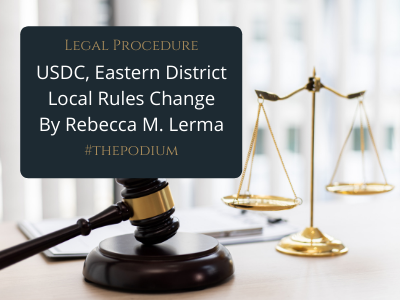
By Rebecca M. Lerma, Paralegal of Stoel Rives, LLP
Member of Sacramento LPA
I attended a presentation by the Federal Bar Association where the Magistrate Judges presented on local rule changes which went into effect in March 2022.
Here are a few highlights. Also included is a link to the redlined local rule changes.
Local Rule 135 – Consent is no longer required for service of electronic documents. Attorneys may no longer opt out. Your registration as a filing user constitutes your consent. The only persons who will still get paper service are pro se parties and prisoners.
Local Rule 173 – There is an existing ban on broadcasting proceedings. However, the court is currently in an audio streaming pilot program where live-streaming proceedings might occur in your cases as part of the pilot program.
Local Rule 174 – Appearance by video conference or by telephone may be requested. (Note: Check your judge’s standing orders as most will post their appearance preferences. Magistrate Judge Cota prefers personal appearance; Magistrate Judge Clair will give in-person argument time to any attorneys with 1-5 years who need court experience).
Local Rule 230 – Motion hearing dates changed from 28 days to 35 days’ notice. They are no longer calculating opposition and reply dates based on the hearing date. It is now calculated based on your filing date. Oppositions are due 14 days from the date motion is filed. Replies are due 10 days after the opposition is filed. [Magistrate judges generally noted this is to even the playing field and make it consistent so motions that are continued do not get their briefing continued. They prefer to have it fully briefed and then continuances are dealing with the hearing date change move only.]
After a reply is filed, no additional memoranda, papers, or other materials may be filed without prior Court approval except:
(1) Objection to Reply Evidence. If new evidence has been submitted with the reply brief, the opposing party may file and serve, no later than seven (7) days after the reply is filed, an Objection to Reply Evidence stating its objections to the new evidence. The Objection to Reply Evidence may not include further argument on the motion.
(2) Notice of Supplemental Authority. Either party may file a notice of supplemental authority to bring the Court’s attention to a relevant judicial opinion issued after the date that party’s opposition or reply was filed. The notice of supplemental authority may contain a citation to the new authority but may not contain additional argument on the motion.
NEW Local Rule 233 – Motions for Administrative Relief
Housekeeping motions such as motions to exceed applicable page limitations; requests to shorten time on a motion; requests to extend a response deadline; requests to alter a briefing schedule; or requests to alter a discovery schedule that do not affect dispositive motion filing dates, trial dates, or the final pre-trial conference must be labeled and filed as a Motion for Administrative Relief. They must not exceed 5 pages excluding declarations and exhibits and must include a proposed order. Oppositions may be filed within 5 days. These administrative motions are submitted without hearing.
Local Rule 251 – Joint Statements must be filed at least 14 days before the hearing date (it was previously 7 days). Motions for Protective Orders now act as a stay of that discovery pending resolution of the motion.
Appendix A – Pilot program to case assignments. Magistrate judges will start to be assigned to cases as a direct assignment. They are going to start with 20-30% and adjust as needed. You will have 90 days to consent or request reassignment to the District Judge. The magistrate judges do not see declinations so you should not worry about what they will think. They only see consent if all parties consent. They are hopeful this program will help reduce the workload for District Court Judges and will result in faster resolutions.
What’s my name?!? Pet peeve for the magistrate judges. Do not call them Magistrate [name], call them Magistrate Judge [name].
Categorized in: Legal Procedure
| << previous | next >> |








